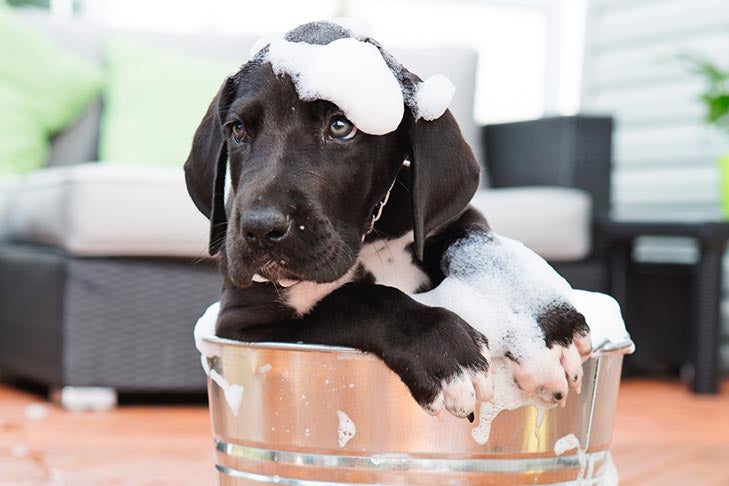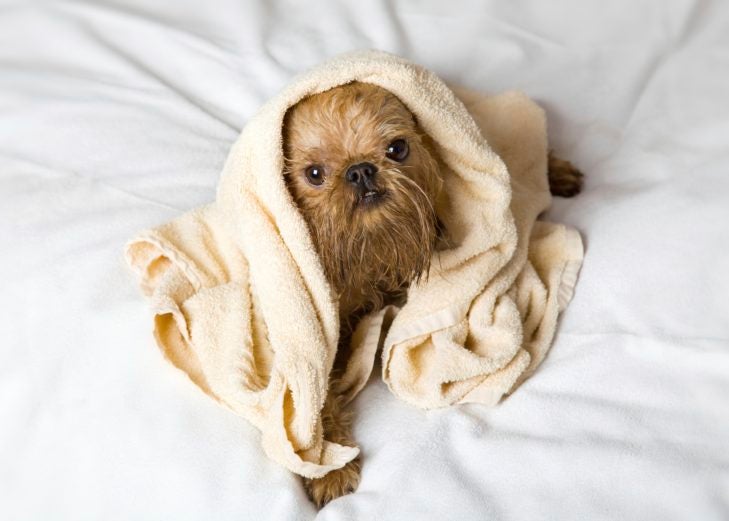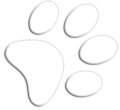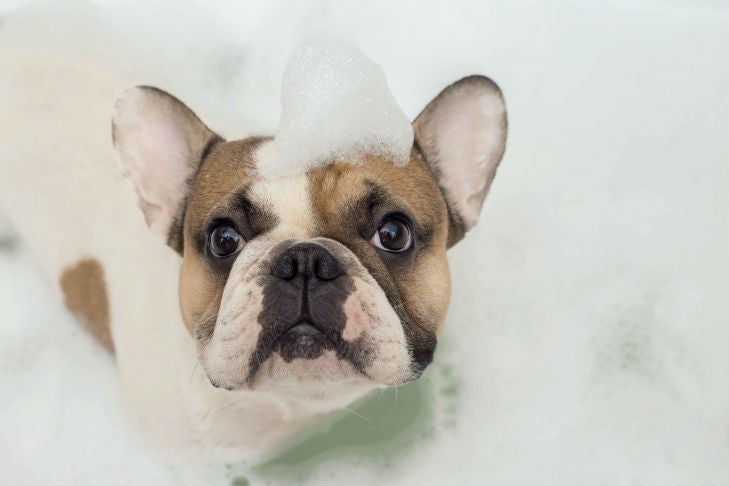
Cute, cuddly, and full of personality, puppies might just be the key to happiness. But that happiness comes with a little bit of work, especially when it comes to bathing. Fortunately, there’s a way to make bath-time enjoyable for both you and your dog. Jennifer Bishop-Jenkins, an international certified master groomer and owner of Love Fur Dogs in Glencoe, Illinois, shares her insights on the best approach to bathing your puppy.
Step 1: Determine Your Puppy’s Coat Type
Before you even get your dog wet, figure out what type of shampoo and conditioner to use. This depends upon what type of fur your puppy has. Talk to your vet first to find out what products suit your puppy best.
“Some coats need more minerals,” notes Bishop-Jenkins. “The short coats really need oil to the point of grease. Long-coated dogs need humectants [moisturizers].”

Step 2: Provide Treats and Cuddles
Bishop-Jenkins encourages her clients to start bathing their puppies as young as eight weeks old, as it establishes a life-long routine. But take it one step at a time. A puppy’s first visit to the groomer often doesn’t even consist of bathing. It simply serves to teach them that grooming isn’t scary.
“We let the puppy run loose,” she explains. “We put them up on the table, put on a loud clipper, and run a light brush over them. There’s lots of treats, swaddling, and cuddling. We make them feel safe.”
Step 3: Start With Lukewarm Water and a Rag
There is no need to use cleansing products when the dog is very young. Be sure the water is lukewarm so that the ritual is pleasant for your puppy. No one wants a boiling hot bath and dogs are sensitive to heat.
“Until the dog is three or four months old, all you really need to use is a warm wash rag,” says Bishop-Jenkins. “Dogs’ body temperatures run higher than ours. Their experience with temperature is different from ours.”
Step 4: Graduate to Using Shampoo
Once your puppy is at least three months old, it’s time to start using shampoo and conditioner.
“Select shampoos and conditioners that are made for dogs and pH balanced,” says Bishop-Jenkins, who recommends plant-based products with no chemical additives. “And don’t buy the cheapest thing out there. I talk to professionals about getting the best professional type that I can get.”
Step 5: Be Gentle
“Bathing a puppy under six months old is very comparable to bathing a human infant,” says Bishop-Jenkins. “Puppies, like babies, aren’t used to the feeling. They can’t protect themselves.”
Don’t scrub. Rather, use a very soft stream of water and gentle hand motions that move in the same direction that your puppy’s hair grows. Use this same direction when brushing and blow-drying.
Step 6: Avoid Openings Around the Face
No one wants soap in their eyes, including your puppy. Even tearless shampoos can irritate your dog’s eyes and you’ll also need to be careful around the ears, nose, and mouth.
“Dogs’ ear canals are shaped like an L,” says Bishop-Jenkins. “If water gets down there, it gets trapped and causes ear infections.”
She advises using minimal product around the face. Also, pinching the base of the ear shut using your thumb and forefinger when cleaning the face.
Step 7: Rinse Thoroughly
Your dog isn’t clean until the soap is actually rinsed away, Bishop-Jenkins points out. So give your dog a good rinse.
“When you think you’ve rinsed enough then rinse some more,” she advises. “Get every molecule off your dog.”
Step 8: Don’t Forget the Conditioner
“Dogs’ skin and coats are the most important part of their body,” says Bishop-Jenkins. “Shampoo strips out moisture. Dogs need conditioner to keep their fur and skin from drying out.”
Dog conditioner is just as important as shampoo. As you did with the shampoo, give your dog a full rinse to be sure all the conditioner is gone.
Step 9: Blow Dry Time
Once your puppy is clean and conditioned, give them a gentle blow dry, but don’t use any blow-dry cream or other styling aid. Once again, gentleness is key. Use a small handheld blow dryer on a low setting and brush your dog’s hair in the direction it grows.

Step 10: Maintain a Bathing Routine
Bathing should happen monthly, as your dog’s skin and fur get clogged up with oil and dirt over time.
“Puppies are in training for a lifetime,” she says about the importance of getting your dog accustomed to bath-time. “You don’t train a puppy one time. You have to do it repeatedly, gently, minimally, and gradually, knowing you’re teaching them about an experience that they will have for the rest of their lives.”
This article is intended solely as general guidance, and does not constitute health or other professional advice. Individual situations and applicable laws vary by jurisdiction, and you are encouraged to obtain appropriate advice from qualified professionals in the applicable jurisdictions. We make no representations or warranties concerning any course of action taken by any person following or otherwise using the information offered or provided in this article, including any such information associated with and provided in connection with third-party products, and we will not be liable for any direct, indirect, consequential, special, exemplary or other damages that may result, including but not limited to economic loss, injury, illness or death.



